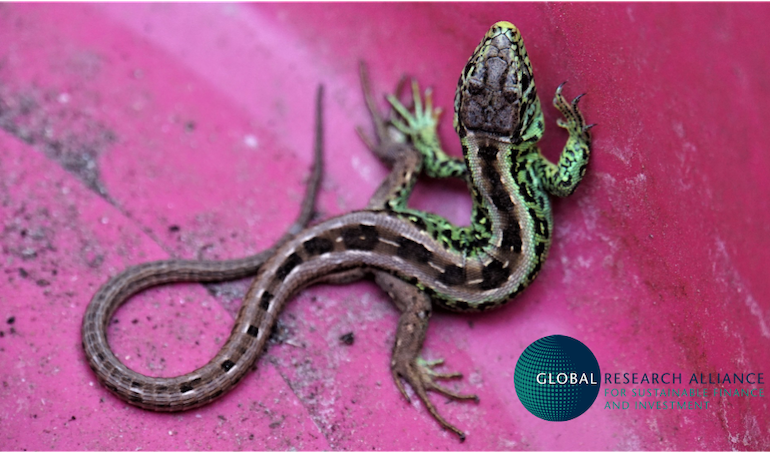
China’s Commitment to Biodiversity Conservation
461
Interpretation: “Opinions on further Strengthening the Protection of Biodiversity” and its impact on green finance, sustainable development, and the Belt and Road Imitative (BRI)
On October 19, 2021, the General Office of the Central Committee of the Communist Party of China and the General Office of the State Council jointly issued the “Opinions on further Strengthening the Protection of Biodiversity.” This document is highly significant as it outlines China’s future development and laws concerning biodiversity protection. As a result, this opinion will have a significant impact on China’s conservation policies.
The Chinese government has recognized the importance of biodiversity protection for sustainable development. The country is home to a vast array of unique plant and animal species, and the loss of biodiversity could have a severe impact on the environment, society, and economy. Therefore, China is taking proactive measures to conserve its natural resources.
The “Opinions on further Strengthening the Protection of Biodiversity” emphasizes the need for increased protection of biodiversity in China. It emphasizes the significance of conservation, sustainable development, and ecological civilization construction. The document calls for the strengthening of policy measures, institutional mechanisms, and public participation to protect biodiversity.
One of the significant features of the opinion is the emphasis on the protection of key ecological regions, such as wetlands, forests, grasslands, and marine ecosystems. These regions are critical for maintaining biodiversity and play a crucial role in supporting human well-being. The document highlights the importance of preserving these regions and calls for the implementation of comprehensive management measures.
Another important aspect of the opinion is the emphasis on the integration of biodiversity conservation into economic and social development. The document calls for the promotion of green development, circular economy, and low-carbon development. The government aims to integrate biodiversity protection into its economic and social development plans to ensure that conservation efforts are sustainable in the long term.
Finally, the timing of the publication of the opinion is noteworthy. It coincides with the start of the Conference of Parties on Biological Diversity (COP15) on biological conservation in Kunming, China. COP15 is a critical international forum where world leaders, policymakers, and conservationists come together to discuss issues related to biodiversity conservation. Therefore, the “Opinions on further Strengthening the Protection of Biodiversity” is significant in setting China’s priorities for biodiversity protection and conservation during this crucial period.
In conclusion, the “Opinions on further Strengthening the Protection of Biodiversity” is an important document that outlines China’s future development and laws concerning biodiversity protection. The document emphasizes the importance of conservation, sustainable development, and ecological civilization construction. It calls for the strengthening of policy measures, institutional mechanisms, and public participation to protect biodiversity. The document is a significant step towards ensuring that China’s natural resources are conserved for the benefit of future generations.
In this analysis, we will provide a summary of the opinions and assess its potential effects on green finance, the Belt and Road Initiative (BRI), as well as other areas of sustainable finance and development.
Overview of the Opinions
The Opinions present the idea and implementation of China’s endeavors to conserve biodiversity and clarify the significance of China’s biodiversity conservation goals in the global arena. The Opinions highlight four primary aspects:
- The role of biodiversity for cultivating a harmonious coexistence between nature and man.
- How to improve the effectiveness of biodiversity protection through strengthening the national park system, in-situ and ex-situ protection, and biosafety management, improving the quality of ecological development, and promoting biodiversity conservation and green development.
- How to improve biodiversity governance capabilities through improved regulations and policies, law enforcement and supervision, and public participation.
- International cooperation in biodiversity conservation
Part I: Harmonious coexistence between man and nature
The “Opinions on further Strengthening the Protection of Biodiversity,” issued by the General Office of the Central Committee of the Communist Party of China and the General Office of the State Council, recognizes the critical importance of biodiversity conservation and highlights the need for global cooperation to address the challenges faced by our ecosystems.
The Opinion acknowledges the loss of biodiversity and degradation of ecosystems at an alarming rate, which has severe consequences for the environment, society, and the economy. The document stresses the importance of taking immediate action to address these issues, emphasizing the need for a multilateral approach.
The Opinion recognizes that biodiversity protection is critical for sustainable development, and therefore, it should be prioritized. Sustainable development balances economic, social, and environmental factors to ensure that the needs of the present generation are met without compromising the ability of future generations to meet their own needs. Biodiversity conservation is a critical element of sustainable development, as it ensures that ecosystems remain intact and can continue to provide the essential services that support human well-being.
The Opinion also highlights the importance of international cooperation in addressing these issues. Biodiversity conservation is a global concern, and therefore, efforts must be made to ensure that all countries work together to address the challenges posed by the loss of biodiversity and degradation of ecosystems. The document emphasizes the need for multilateral efforts to support biodiversity conservation and sustainable development, promoting global cooperation in addressing these issues.
In conclusion, the “Opinions on further Strengthening the Protection of Biodiversity” recognizes the critical importance of biodiversity conservation and highlights the need for global cooperation to address the challenges faced by our ecosystems. The Opinion emphasizes the need for multilateral effort, prioritizing biodiversity protection, and sustainable development in addressing these issues. This Opinion is a critical step in ensuring that China takes a proactive role in addressing the challenges of biodiversity loss and ecosystem degradation and provides a framework for global cooperation to achieve these goals.
Part II: Biodiversity protection
Part IIa: Optimising in-situ protection systems

The optimization of in-situ protection systems relies on two crucial components: national parks and ecological protection red lines.
The Opinion highlights the significance of creating a network of nature reserves and national parks. China has established nearly 10,000 natural reserves since 1956, covering approximately 18% of the country’s land area. This has resulted in an increase in wildlife population, such as the giant pandas, whose wild population has increased from 1,114 to 1,864 in four decades. Similarly, the number of crested ibis has risen from 7 during their discovery to over 5,000 presently.
China has recognized the need to protect its natural heritage and promote ecological security. In recent years, China has actively promoted the establishment of national parks as a foundation for preserving habitats, improving the quality of the ecological environment, and maintaining national ecological security. As a result, since 2015, ten national park system pilot projects have been launched in various regions across the country.
National parks play a crucial role in conserving biodiversity, protecting wildlife habitats, and promoting sustainable development. The establishment of these parks has helped preserve natural resources and wildlife, promote environmental education, and foster a culture of conservation among the public.
China’s national park system pilot projects have been implemented in various regions, including the Sanjiangyuan National Park, Giant Panda National Park, Qilian Mountain National Park, and Zhangjiajie National Forest Park. These parks have provided a significant boost to the tourism industry, while also ensuring that the local ecology is preserved and the needs of the local communities are met.
China has set a goal of having a national park system covering 18% of the country’s total land area by 2020. This ambitious plan demonstrates the government’s commitment to biodiversity conservation and environmental protection. The establishment of national parks not only promotes ecological security but also contributes to the sustainable development of the country.
In conclusion, the establishment of national parks is a vital component of China’s efforts to promote environmental protection, biodiversity conservation, and sustainable development. The launch of ten national park system pilot projects since 2015 is a significant step towards achieving these goals. It is hoped that the national park system will continue to grow and expand to cover more regions of the country, thereby contributing to China’s ecological security and sustainable development.
In addition to emphasizing the need for a network of national parks, the Opinion also highlights the importance of conserving critical ecosystems such as forests, deserts, wetlands, mangroves, coral reefs, and seagrass beds. These ecosystems play a vital role in maintaining the balance of the natural world and preserving biodiversity.
To this end, China has initiated the Ecological Conservation Red Line (ECRL) initiative, which was launched in 2011. This initiative aims to establish a red line of ecological protection, which serves as a boundary for key ecological areas that require protection. The red line helps to ensure that development activities do not harm the environment and that ecological conservation is given priority.
The ECRL initiative has received widespread acclaim for its contribution to ecological conservation and sustainable development in China. It has helped to protect critical ecosystems and promote biodiversity conservation, thereby ensuring a healthy environment for future generations.
China’s focus on conserving critical ecosystems aligns with the global effort to protect biodiversity and the environment. It is crucial that we recognize the importance of preserving natural habitats and conserving biodiversity to ensure the sustainability of the planet.
In conclusion, the Opinion’s emphasis on conserving critical ecosystems and the ECRL initiative demonstrates China’s commitment to environmental protection and sustainable development. By prioritizing biodiversity conservation and ecological protection, China is making significant strides towards a greener future. It is vital that other countries follow suit and take action to protect the planet and its precious ecosystems.
Part IIb: Optimising the ex-situ protection system
Conservation projects that involve the preservation of endangered species and biological genetic resources outside their natural habitat are known as ex-situ protection. These projects may include rescue programs for endangered species and the collection and preservation of biological genetic resources.
China has made significant progress in ex-situ protection by establishing 250 wild animal rescue and breeding bases. Through these bases, more than 60 rare and endangered wild animals have been artificially propagated, thereby increasing their population and reducing the risk of extinction.
These efforts are crucial for biodiversity conservation, as they ensure that endangered species are protected and their genetic diversity is preserved. This is especially important in the face of increasing habitat loss and degradation caused by human activities.
In conclusion, the establishment of wild animal rescue and breeding bases and the propagation of rare and endangered wild animals are essential components of ex-situ protection conservation projects. China’s progress in this area is commendable and underscores the country’s commitment to preserving biodiversity and promoting sustainable development. It is crucial that we continue to prioritize biodiversity conservation and take action to protect endangered species and their habitats.
Part IIc: Strengthening biosafety management
China’s biosafety strategy consists of various components, including the implementation of a biosafety law, the development of mechanisms to prevent and control the invasion of alien species, and the protection of biological genetic resources. These measures aim to enhance biosafety and promote sustainable development in the country.
To strengthen the prevention and control of alien species at ports, China has implemented various measures such as quarantine inspections, risk assessments, and emergency response mechanisms. Additionally, efforts have been made to improve the safety and management of genetically modified organisms. The country has also conducted surveys of important biological genetic resources, with the third national survey and collection of crop germplasm resources currently underway. The collection effort has yielded 92,000 copies of crop germplasm resources, 90% of which are newly-discovered.
These efforts have proven to be successful in promoting biodiversity conservation in China. For example, in the past decade, an average of 200 new plant species have been discovered in China each year. Such efforts are crucial in addressing the loss of biodiversity and degradation of ecosystems caused by human activities.
In conclusion, China’s biosafety strategy is a comprehensive approach that aims to promote sustainable development and enhance biosafety. Efforts to prevent the invasion of alien species, protect biological genetic resources, and discover new plant species are essential components of this strategy. It is important that these efforts continue, as they are crucial in safeguarding biodiversity and maintaining a healthy ecological environment.
Part IId: Improving the quality of the ecological environment
China’s biodiversity protection efforts also extend to ecological restoration and promoting the stability of the ecosystem, as maintaining national ecological security is a key priority. The country has implemented a series of ecological protection and restoration projects, with a focus on systemic management of different landscapes. As a result of these efforts, China’s forest area and accumulation have maintained double-digit growth for 30 consecutive years.
According to data, approximately 25% of the newly-added green area globally from 2000 to 2017 has come from China, demonstrating the country’s commitment to protecting and restoring the environment. In addition to increasing forest coverage, China has also taken measures to prevent soil erosion, promote wetland restoration, and improve water quality.
China’s focus on ecological restoration is also evident in its Belt and Road Initiative (BRI), which includes the “Green Belt and Road” concept. This initiative aims to promote sustainable development by prioritizing ecological and environmental protection in the construction of infrastructure projects.
Overall, China’s efforts towards biodiversity protection, ecological restoration, and promoting sustainable development are extensive and varied. As the world continues to grapple with issues such as climate change and habitat destruction, China’s approach offers valuable lessons and insights for other nations looking to tackle these challenges.
In the fight against pollution, China has taken active measures. The national average concentration of fine particulate matter (PM2.5) was reduced by 28.3% compared to 2015, reaching 33 micrograms per cubic meter in 2020.

Part III: Governance
Part IIIa: Improving policies and regulations
China has made noteworthy progress in reinforcing its organizational leadership concerning environmental policies and regulations. The National Committee for the Conservation of Biodiversity of China has been established, and significant biodiversity conservation projects and a conservation network have been outlined in the 14th Five Year Plan for the National Economic and Social Development of the People’s Republic of China, and the Long-Term Goals for 2035.
In the past decade, China has strengthened its legal framework to preserve its biodiversity. Over 20 laws relating to biodiversity were enacted during this period to safeguard the environment. Additionally, several provinces and municipalities have issued regulations based on their local conditions.
In recent years, China has made significant strides in strengthening its environmental protection policies and regulations, and this includes an emphasis on law enforcement. As part of this effort, environmental protection inspections and crackdowns on biodiversity-related crimes have been stepped up.
China’s strengthened law enforcement efforts are crucial in ensuring that environmental laws and regulations are being followed, and that biodiversity-related crimes are being punished. These efforts include regular inspections of factories, power plants, and other sources of pollution, as well as investigations into illegal wildlife trade and poaching.
These measures have already yielded some positive results. For example, in 2018, Chinese authorities launched a crackdown on illegal wildlife trade and seized more than 2,000 live animals and 27 tonnes of animal products. In addition, a number of people were arrested and charged with wildlife trafficking offenses.
Overall, China’s efforts to strengthen law enforcement in relation to environmental protection and biodiversity conservation demonstrate the country’s commitment to building a more sustainable future. By ensuring that laws and regulations are being followed, and that biodiversity-related crimes are being punished, China is taking an important step towards protecting its natural resources and promoting a healthier environment for all.
Part IV: The role of international cooperation for biodiversity conservation
Biodiversity loss is a global issue that requires international cooperation, and China recognizes the importance of multilateralism in conservation efforts. The recently released opinions on biodiversity conservation in China emphasize the country’s commitment to international cooperation and implementing the Convention on Biological Diversity protocols.
One way China is supporting multilateral cooperation is through initiatives such as the Belt and Road Initiative (BRI) and South-South Cooperation. These mechanisms aim to provide developing countries with the necessary capacity building and green finance to address biodiversity conservation challenges.
Moreover, the BRI International Green Development Coalition (BRIGC) is working towards the development of a big data platform for ecological and environmental protection services from over 100 countries. This platform will help to enhance cooperation in conservation efforts and promote sustainable development across the globe.
In addition, China has taken steps to strengthen its environmental law enforcement and crackdown on biodiversity-related crimes. These efforts are part of the country’s commitment to biodiversity conservation and the protection of its ecological environment.
As a global leader in biodiversity conservation, China has established a network of nature reserves, implemented critical ecosystem conservation, and strengthened its organizational leadership in relation to environmental policies and regulations. It has also bolstered its laws to protect its biodiversity and taken significant steps towards increasing ecological protection and restoration efforts.
In conclusion, China’s commitment to multilateralism, international cooperation, and strengthening environmental law enforcement will continue to be vital in the global effort to protect biodiversity and address the challenges of biodiversity loss.
Evaluation of the Opinions
The opinions put forward ambitious statements for biodiversity conservation, such as “prioritizing protection of nature in social development” and “making biodiversity the basis, goal, and means of sustainable development.” These goals go beyond viewing biodiversity solely as an instrument for economic growth, and instead recognize its broader significance. Additionally, specific targets have been set, such as having 18% of the land area under nature reserve, achieving a forest coverage rate of 244.1%, and reaching a grassland vegetation coverage of around 57%.
China has recently released a set of opinions aimed at strengthening its biodiversity conservation efforts. These opinions lay out an ambitious vision for biodiversity protection that goes beyond its role as a tool for economic development. The opinions state that biodiversity should be seen as the basis, goal, and means of sustainable development. This ambitious vision is backed by concrete goals such as having 18% of land area under nature reserve, a forest coverage rate of 244.1%, and a grassland vegetation coverage of about 57%.
One of the key themes of these opinions is the strengthening of the central government’s role in policy design, implementation, and oversight. The opinions state that biodiversity conservation mechanisms should be “government-led,” with corporate actions and public participation to follow. This is a significant shift towards a more centralized approach to biodiversity conservation in China.
The opinions also highlight China’s role in international biodiversity governance. China is recognized as an implementer of international conventions such as the Convention on Biological Diversity (CBD), as well as a contributor to global biodiversity conservation efforts. The opinions emphasize China’s capacity to innovate and provide capacity for global conservation efforts, particularly in the Belt and Road Initiative (BRI) and in South-South cooperation with China’s southern neighbors.
Green finance is briefly mentioned in the opinions, but mostly as a broader cooperation mechanism within the BRI. The opinions stress the importance of multilateralism and international cooperation in biodiversity conservation, particularly in developing countries. Overall, the opinions provide a comprehensive framework for China’s biodiversity conservation efforts, emphasizing the importance of strong government leadership, international cooperation, and a long-term vision for sustainable development.
China’s recently released opinions on biodiversity conservation have set a strong framework for the country’s future efforts in this area. While the document covers a wide range of topics, there are some important areas where further development and strengthening may be needed.
One area of focus is the prioritization of biodiversity conservation. While the opinions state that biodiversity conservation is a priority in social development, this statement is later weakened by describing it as “an important part” of ecological civilization construction. To truly prioritize biodiversity conservation, it should be viewed as a crucial component of sustainable development that cannot be compromised.
Another important area for development is the role of green finance in biodiversity conservation. While the opinions briefly touch on this topic, it is mostly presented as a broader cooperation mechanism in the Belt and Road Initiative (BRI). The document should provide more concrete and specific goals for green finance in biodiversity conservation, including how it will be used to support conservation efforts and what types of projects will be prioritized.
Finally, while the opinions do address the role of the central government in policy design and implementation, more attention should be given to public participation. While corporate actions are also mentioned, there is a need for more emphasis on the role of individuals and communities in biodiversity conservation. It is important for the public to be educated and empowered to take an active role in conservation efforts, as their support is critical for the success of any conservation initiative.
Overall, the opinions provide a strong framework for biodiversity conservation in China, but there are areas where further development and strengthening are needed to ensure that conservation efforts are prioritized and effective. By addressing these areas, China can set an example for other countries to follow in the global effort to protect and preserve biodiversity.
- The role of the financial sector to accelerate biodiversity finance needs to be strengthened. While the opinions stipulate the “use of fiscal and tax incentives to actively mobilize private capital to invest in biodiversity conservation”, it does not focus on the important responsibility of the financial sector to shift financial flows away from biodiversity-destroying activities.
- The role of data and data standards for biodiversity conservation and biodiversity loss management should also be strengthened, particularly in an internationally aligned standard for the financial sector. The global financial community is working in several working groups on biodiversity finance standards, such as the Task Force for Nature Related Financial Disclosure (TNFD), the Science-based targets initiative (SbTI), IRIS+ and others. China, with rich biodiversity, should seize the moment to accelerate sharing relevant data and provide capacity to the global data standardization ambitions. This would allow relevant institutions, including financial institutions, to better evaluate biodiversity impacts of projects and other assets and thus evaluate de-facto biodiversity risks.
- The role of trade and trade finance (apart from illegal trade of wild animals and plants which is highlighted in the opinions) needs further clarification, particularly as China is a main importer of agricultural and timber products that severely risk deforestation in countries like Brazil, Indonesia, Papua New Guinea and others. By more clearly banning trade of illegal sourced goods (not just the illegal trade of protected plants and animal, but also the trade of agricultural products and soft commodities, like timber, that were grown on illegally de-forested land, the financial sector would have to become more involved in green trade finance as to avoid, e.g., money laundering.
- The ambition to become nature-positive after 2030 as an overall economy and in ideally most economic activities and the ambition to protect 30% of land and water by 2030, as suggested in the COP15 documents, is not taken up and therefore deviates from more multilateral agreements. If this commitment were to be taken up as a high-level commitment, both the legal system and the financial system would have to develop better compliance mechanisms to adhere to this goal, which again would change the calculus of biodiversity finance.
- Commitments to avoid nature-destroying BRI investments and economic activities that negatively affect biodiversity richness in the BRI needs strengthening. As the BRI includes some of the most biodiversity-rich countries, such as the DR Congo, or countries South-East Asia, as well as Latin America, a stronger top-level guidance requiring the application of existing Chinese and local laws and ideally more stricter international soft law in accordance with the Green Development Guidelines issued in July by the Ministry of Commerce (MOFCOM) and Ministry of Ecology and Environment (MEE) would be important to avoid further destruction of biodiversity in the BRI. This would also be in line with the Green Development Guidance issued by the BRIGC, that requires “green” and “yellow” project to do no biodiversity harm and avoid all biodiversity hotspots and key biodiversity areas (KBAs).



